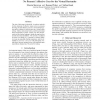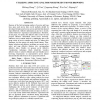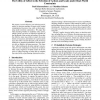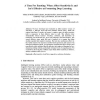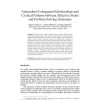131
click to vote
FLAIRS
2011
14 years 5 months ago
2011
The aim of this paper is threefold: it explores methods for the detection of affective states in text, it presents the usage of such affective cues in a conversational system and ...
122
click to vote
ICIP
2009
IEEE
14 years 12 months ago
2009
IEEE
Because of the fast increasing number of movies and long time span each movie lasts, novel methods should be developed to help users browse movies and find their desired clips eff...
116
click to vote
ICAI
2009
14 years 12 months ago
2009
We present a novel affective goal selection mechanism for decision-making in agents with limited computational resources (e.g., such as robots operating under real-time constraint...
136
click to vote
UMUAI
2008
15 years 2 months ago
2008
We explored the reliability of detecting a learner's affect from conversational features extracted from interactions with AutoTutor, an intelligent tutoring system that helps...
116
click to vote
IJMMS
2006
15 years 2 months ago
2006
There is an increasing interest in developing intelligent human
124
click to vote
IJMMS
2008
15 years 2 months ago
2008
Generally, an experienced therapist continuously monitors the affective cues of the children with Autism Spectrum Disorders (ASD) and adjusts the course of the intervention accord...
103
click to vote
ITS
2010
Springer
15 years 4 months ago
2010
Springer
We have developed and evaluated an affect-sensitive version of AutoTutor, a dialogue based ITS that simulates human tutors. While the original AutoTutor is sensitive to learners’...
129
click to vote
EATIS
2007
ACM
15 years 6 months ago
2007
ACM
In this paper we propose an ontology based representation of the affective states for context aware applications that allows expressing the complex relations that are among the af...
110
click to vote
AIED
2009
Springer
15 years 6 months ago
2009
Springer
We explored the complex interplay between students' affective states and problem solving outcomes. We conducted a study where 41 students solved 28 analytical reasoning proble...
105
click to vote
AIED
2009
Springer
15 years 6 months ago
2009
Springer
We explored the possibility of predicting learners’ affective states (boredom, flow/engagement, confusion, and frustration) by monitoring variations in the cohesiveness of tutori...
